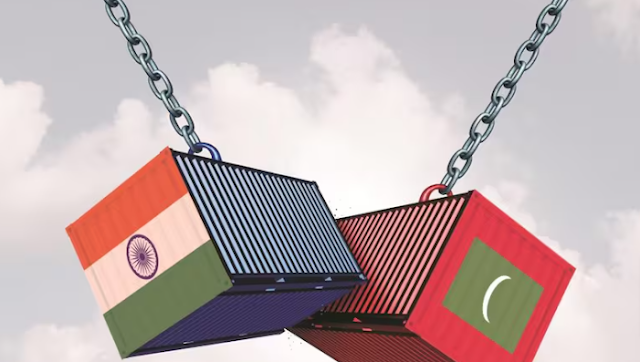 |
| Impacts of India's Export Restrictions to Maldives |
India's Directorate General of Foreign Trade (DGFT) has recently imposed limitations on the export of essential commodities to the Maldives. These restrictions dictate that essential items categorized as prohibited or restricted can only be exported through four specific ports in India.
The designated ports include Mundra Sea Port in Gujarat, Tuticorin Sea Port in Tamil Nadu, Nhava Sheva Sea Port (JNPT) in Maharashtra, and ICD Tughlakabad in New Delhi.
These measures were introduced against the backdrop of strained relations between India and the Maldives, exacerbated by various diplomatic challenges. These challenges range from disputes over social media to broader public disagreements, including actions such as travel boycotts.
Port Restrictions and Their Implications:
The imposed port restrictions mandate that all shipments of essential commodities bound for the Maldives must be processed exclusively through the aforementioned four customs stations. This restriction limits the options available for shipping and logistics companies, potentially affecting the efficiency and cost of trade operations. It is likely that such selective port usage involves rigorous scrutiny and additional compliance measures aligned with the Foreign Trade (Development & Regulation) Act of 1992.
Impact on the Maldives:
- Supply and Price Volatility: The limitation of ports may result in reduced flexibility and possible delays in the transportation of essential goods to the Maldives, leading to periodic shortages and increased prices, thereby impacting the cost of living for the locals.
- Import Reliance: Given the Maldives' heavy reliance on imports due to limited agricultural capacity, any disruption in the supply chain, especially for essentials like food products, can significantly impact everyday life.
- Economic Strain: Increased logistic costs stemming from limited port options could translate into higher prices for goods in the Maldives, potentially straining those with fixed incomes or less financial resilience.
- Cultural and Social Impact: Essential goods are not merely economic commodities but also integral to the social and cultural fabric of communities. Disruptions in availability or affordability may lead to social unrest or a decline in the quality of life.
Long-term Considerations:
These restrictions have broader implications on diplomatic relationships and economic agreements. If not resolved through negotiation or diplomatic dialogue, they could lead to long-term shifts in trade partnerships, potentially prompting the Maldives to explore other international markets more aggressively, with various geopolitical consequences.
